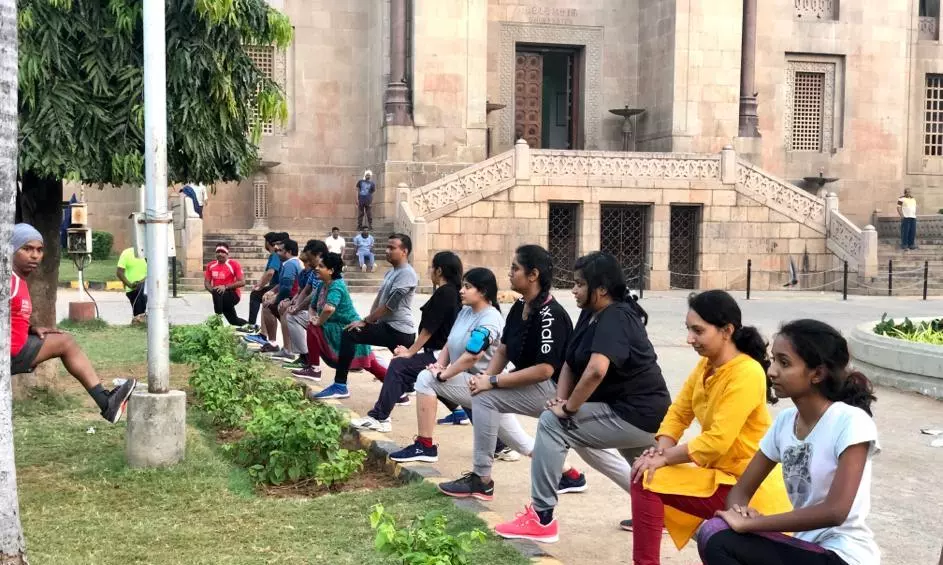Short-Term Preparation Won’t Help Runners, Say Experts

Hyderabad: Running a marathon is no easy feat, demanding not just physical, but mental and emotional strength and awareness. Runners undergo leaps of exercise, training and introspection before participating in any marathon. Every runner has a unique story and the journey to the starting line is often as inspiring as the race itself.
Rajeev Subhedar, a marathon coach, explained his personal approach to training. “Every runner is different,” he said. “I first learn about their age, health and fitness level. Then, I create a plan that’s just for them and adjust it based on the runner’s progress.”
His training includes strength workouts, long runs, cross-training, stretching, and proper rest days to help runners build strength, balance and pace.
Santoshi Tamlurkar, a half-marathoner and trainer, focuses on consistency. “You can’t go from running 5 km to 10 km overnight,” she explained. “Progress has to be gradual and sticking to a structured plan is important.” Her training also includes yoga and stretching to prevent injuries and keep the body flexible.
Rajeev also stated that each runner’s journey is different. “Older runners who’ve been active tend to progress faster, while younger runners often need guidance to avoid overtraining,” he said.
He also stressed that injury management is crucial. “For minor injuries, rest, medication, or physiotherapy works, but for major injuries, a gradual return to training is necessary.”
For those new to marathons, Rajeev advised, “Set clear goals, follow your personalized plan, stay consistent and always prioritize hydration and nutrition.”
Santoshi added, “Strength training is a key to building balance in the body and increasing muscle mass, which helps with overall stability.”
Both trainers said that mental strength is as important as physical fitness. Rajeev said runners should find time for hobbies, relax with loved ones and celebrate every milestone, no matter how small. “A balanced approach to physical and mental well-being is important,” he added.
Warm-ups and recovery walks are as important as the runs themselves. “A good warm-up boosts blood flow and prepares your joints for intense activity. Recovery walks, on the other hand, keep your muscles active, promote healing and help prevent injuries,” Rajeev explained.
Santoshi recommended cross-training activities like swimming, cycling to complement running. “Swimming is especially useful — it builds stamina, improves breathing and works your entire body without straining your running muscles,” she said.
Breathing exercises also play a big role in boosting stamina and lung capacity. “Techniques like abdominal and rhythmic breathing help improve lung function while lowering the heart rate,” said Santoshi. Rajeev suggested breathing exercises like blowing balloons to increase exhalation time, which improves endurance.
P. Srinivas, another expert trainer, explained the importance of planning well in advance. “Marathon training should ideally begin 16 to 20 weeks before race day. This gives runners time to build stamina, recover properly and prepare both physically and mentally,” he advised. Beginners, in particular, should avoid rushing the process to prevent injuries or burnout.“
Training less than eight weeks is not ideal. This period is usually too short for proper marathon preparation, even for seasoned runners, Srinivas added.
He also explained the importance of assessing fitness before starting marathon training. “Runners should be able to jog or run comfortably for at least 30 minutes continuously. Those with medical conditions such as heart disease, joint problems, or asthma should consult a doctor and consider tailored, lower-impact training plans.”
Trainers also stated, “Runners maintain a good diet and nutrition during their training period especially before a marathon, runners eat good meals to prepare their bodies. In the 2-3 days before the race, they focus on eating foods that give them energy. On race day, they have a final meal 1-3 hours before the start to give them that extra boost for the run.”
Vikram, a regular marathoner, shared how running changed his life. “I’ve had asthma for years, but joining the Hyderabad Runners Society was a game-changer,” he said. “The first 10 days were tough, but soon I got used to it. Now, I barely need my inhaler!”
Vikram trains 2-3 times a week, focusing on running, core strengthening, and breathing exercises. “It’s made me healthier,” he said with a smile.
Inspired by his progress, Vikram even got his family to join the group. “This experience has improved my health and made life so much better.”
Santhoshi, the trainer herself, shared her journey, “I started running 16 years ago to lose weight after my pregnancy. Over time, it became a passion,” she says. Now, she runs 21-kilometre races and helps beginners with their training. “It’s amazing to guide people through their first steps. I’ve seen how running can change lives, just like it changed mine.”
“I started my running journey in February 2020, weighing 95 kgs. By February 2024, I had lost 20 kg and transformed my life. I used to be teased about my weight, but one day, I decided to take part in a marathon. There, I found so many people like me, all striving for better health and inspiring each other. That motivation, combined with a commitment to following a good diet and avoiding junk food, kept me going. Today, the girl who was once mocked for her weight can proudly run a half marathon,” said Swati R., another marathoner.
